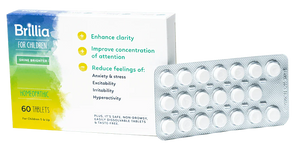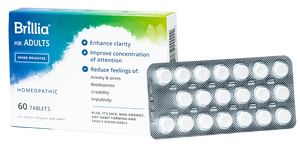From vaccine side effects to poor parenting, there are a lot of myths surrounding what causes ADHD. But is it possible that ADHD can be encoded in our DNA?
Find out what the research says about genetics and ADHD, common symptoms of ADHD in children, and how to get support.
Is ADHD Genetic or Hereditary?
The American Psychiatric Association (APA) reports that an estimated 8.4 percent of children and 2.5 percent of adults in the United States have ADHD.1 Despite this prevalence, researchers have not been able to pin down a definite cause, though they have noticed some trends. The likelihood of a person developing ADHD is influenced by a combination of genes, environmental factors, and possibly dietary choices.
When it comes to genes, there is growing research that suggests ADHD may be hereditary. Genetic studies show there is a 91 percent likelihood of passing the disorder to your children.2 And according to the National Institutes of Health (NIH), at least one third of fathers with ADHD will have children with ADHD.3
The evidence may even be detected in your DNA. In a 2010 study out of the United Kingdom, researchers discovered that small pieces of DNA were missing or duplicated in the brains of children with ADHD.4
Symptoms in Children: How to Tell if Your Kid Has ADHD
No two people experience ADHD alike, but there are some common signs and symptoms to look out for.
The most common symptoms of ADHD in children are:
- Lack of focus
- Distractibility
- Difficulty following instructions
- Forgetfulness
- Fidgeting
- Restlessness
- Poor time management skills
- Careless mistakes
- Excessive talking
- Blurting
- Inability to wait their turn
- Tendency to engage in risky or dangerous behavior
- Acting before thinking
- Easily bored
How Does ADHD Affect the Brain?
A recent study in 2021 showed that some DNA variations in people with ADHD resulted in “lower cortical thickness” in the right lateral prefrontal cortex.5 Brain imaging studies have suggested that this part of the brain has weaker function in people with ADHD, leading to executive dysfunction.6
According to Russell Barkley, PhD, a clinical professor of psychiatry and pediatrics at the Medical University of South Carolina in Charleston, there are anywhere from 25 to 45 genes that are considered high-candidate genes for ADHD and some are related to dopamine regulation in the brain.7> As a key neurotransmitter, dopamine passes information between nerve cells and regulates body functions. Lower levels are associated with classic ADHD symptoms like inattention, impulsivity, and emotional dysregulation.
But the ADHD brain also has some unique strengths. People with ADHD are well-suited to entrepreneurship, which explains the success of people like Sir Richard Branson and Charles Schwab (who both have ADHD). But they also excel in other high-energy, creative professions like music, art, theater, and even athletics.
Another positive quality about having ADHD is the phenomenon of hyperfocus. This refers to a strong fixation on an interest or activity for an extended period of time. Many people with ADHD experience hyperfocus as becoming so involved with something that they seem to block out the world around them. When harnessed correctly, hyperfocus can help people with ADHD excel.
Parenting a Child with ADHD
Parenting is one of the toughest jobs there is, but there are some hacks to make the job easier when it comes to managing your child’s ADHD symptoms.
First and foremost, it’s crucial that you prioritize healthy nutrition and sleep. Such basic components of a healthy lifestyle have been shown to impact the severity of your child’s ADHD symptoms. Try to encourage your child to reduce their screen use and find healthier alternatives like sports, music, art, and other extracurricular activities that will not exacerbate their symptoms. Teaching your child some mindfulness techniques like meditation or mindful breathing can also be a game-changer in helping your child learn how to self-regulate.
When it comes to disciplining your child, aim for simplicity. Make your child aware of which behaviors are permissible and which will result in consequences and be consistent in enforcing the established rules. When you catch your child doing something good, reward the positive behavior to motivate them. Consider using a points system so they can track their progress toward tangible goals. You may want to have a discussion with your child’s teacher to ensure your child’s symptoms are not getting in the way of their academic progress, to request accommodations, and to collaborate on strategies to reinforce positive behavior. With guidance and practice, children can cultivate holistic ways to harness the strengths of ADHD and control their symptoms through healthy lifestyle habits that can potentially help them avoid medication.
But if you find that you need more support, consider starting with a homeopathic medication like Brillia. Whether your child is already taking prescription medication to manage their symptoms or you haven’t yet tried medication, Brillia offers a gentle and impactful approach without any harsh chemicals or harmful side effects. The medication is also extremely targeted so it will not affect any other systems in the body or have a dangerous interaction with other drugs or supplements. Brillia’s active ingredient consists of antibodies to the brain-specific S100B protein, a key regulator of various different intracellular and extracellular brain processes. In a unique approach, Brillia works by attaching to the S100B protein and regulating its activity without destroying, modifying, or changing its concentration. This efficiently stops symptoms like inattention, hyperactivity, irritability, and impulsivity while improving focus and stabilizing the mood. The medication’s success is maximized by Brillia’s 5 Pillar methodology, which combines healthy lifestyle factors with medication for long-term change.
Find out more about how Brillia works and explore more resources on managing ADHD symptoms at the Brillia(nce) Resource Center.
 A whole bunch of support right in your inbox.
A whole bunch of support right in your inbox.







